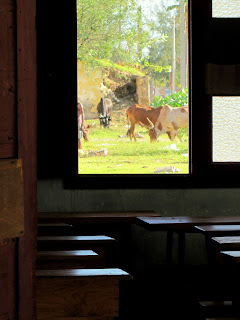What are the students to do?
Evolving Democracy
Our Positive Education Action-Research (PEAR) Laboratory is now facilitating a series of cross-disciplinary student leadership training sessions to develop a Student Technology Leadership Committee, the Universities first explicitly democratic student-run committee, and interestingly, a committee founded on evolutionary principles.
Our unique educational model of BIG Content + Applied Context provides a simple formula for richly integrating evolutionary sciences within the fabric of our learning environments. Let me spare you the theory, and just cut to what we are actually do on the ground.
A BIG History of the Democratic Brain
 We have identified a clear problem in our educational community, the theft our common-pool computer resources. So - as scientists of the human condition, how should our students understand the context to such a problem? Is it, as my biology student suggested, "the problem of the Malagasy people"? That is - is there some essential difference between the Malagasy people and people from Universities where computers don't get stolen? That's one hypothesis that appears popular among my students, but I offer a different theory. I suggest to my students that perhaps the causal explanation for the thefts lie not in differences among people, but in differences among the organization of groups of individuals. How can we test these competing hypotheses?
We have identified a clear problem in our educational community, the theft our common-pool computer resources. So - as scientists of the human condition, how should our students understand the context to such a problem? Is it, as my biology student suggested, "the problem of the Malagasy people"? That is - is there some essential difference between the Malagasy people and people from Universities where computers don't get stolen? That's one hypothesis that appears popular among my students, but I offer a different theory. I suggest to my students that perhaps the causal explanation for the thefts lie not in differences among people, but in differences among the organization of groups of individuals. How can we test these competing hypotheses?Well, as scientists we always start with a literature review. Here at the PEAR Lab this means exploring a structured framework based on the Thresholds of Big History utilized in the Bill Gates sponsored Big History Project.
Students explore a BIG History of the Democratic Brain, by reviewing selected chapters of history from a Unified Human Sciences perspective. Criss-crossing among disciplines and scales of time and space, a coherent narrative begins to form around group dynamics, human decision making, and the functions and scales of democracy.
Part of this BIG History also includes the many Little Histories of the science of the BrainMind and Human Culture itself.
It is here that we drill deeper into the functioning of groups, and it is here where we start to do something I call STEAMing a BIG History. In the education world, there is a growing movement to integrate Science, Technology, Engineering, Arts, and Mathematics (STEAM) into a cohesive integrated approach (Yakman 2008, 2010). We are connecting this with the innovations of BIG History and channeling both into applied service-learning projects. Let me explain.
A Recipe for STEAMed BIG History
- 1 part: deep-time historical narrative
- 1 part: concepts from evolutionary studies
- A pinch of history and philosophy of science
- A hefty dosage of art, action, and awe!
- Mix with technology and democracy training and let ferment until ripe
I met with Etienne and his student colleagues to "train-the-trainer" - in a variety of technology development areas. For these students, using computers is a whole new world, we start with the very basics of Gmail and internet searches. Yet, within about three hours he has started to develop his Biology Departments struggling website, and - we were able to examine our hypotheses about the stolen computers through experimental modeling.
Using the actor-based modeling software, Net Logo (Wilensky 1999), we explored a social-dynamics model called "Prisoner's Dilemma N-Person Iterated model" (Wilensky 2002) . Here, the "actors" in the model walk around randomly, and when two actors meet, they play a simple game. Each actor can either "cooperate" or "defect". If both players cooperate, both will get 3 points. If one cooperates and one defects; the cooperator gets nothing and the defector gets 5 points. If both players defect, both get 1 point. Very simple rules, yet as we saw - some very complex dynamics emerge.
By altering the behavioral strategies of the actors in our little world - Etienne and friends get to literally play with a multitude of societal scenarios:
- What if we live in a world where half the people always cooperate and half always defect?
- What if we live in a world where reputation matters and there is monitoring and enforcement of cooperation?
In the past, Etienne and his friends would have kept on believing that this computer theft was simply "the problem of the Malagasy people". Today, they have been given the tools to create group-level changes to prove that in fact, the Malagasy people are every bit as good as the rest of the world - we just all need environments that allow the better angels of our nature to emerge and flourish!
References
Wilensky, U. (1999). NetLogo. Evanston, IL: Center for Connected Learning and Computer-Based Modeling, Northwestern Institute on Complex Systems, Northwestern University. Retrieved from http://ccl.northwestern.edu/netlogo/
Wilensky, U. (2002). NetLogo PD N-Person Iterated model. Evanston, IL: Center for Connected Learning and Computer-Based Modeling, Northwestern Institute on Complex Systems, Northwestern University. Retrieved from http://ccl.northwestern.edu/netlogo/models/PDN-PersonIterated
Wilson, D. S., Ostrom, E., & Cox, M. E. (2013). Generalizing the core design principles for the efficacy of groups. Journal of Economic Behavior & Organization, 90, S21–S32. doi:10.1016/j.jebo.2012.12.010
Yakman, G. (2008). STEAM education: an overview of creating a model of integrative education. Proceeding of PATT on 19th ITEEA conference.
Yakman, G. (2010). STE@M: An Overview of an Educational Model, (June). Retrieved from http://www.steamedu.com/WhatisSTEAM.Aggie.pdf























